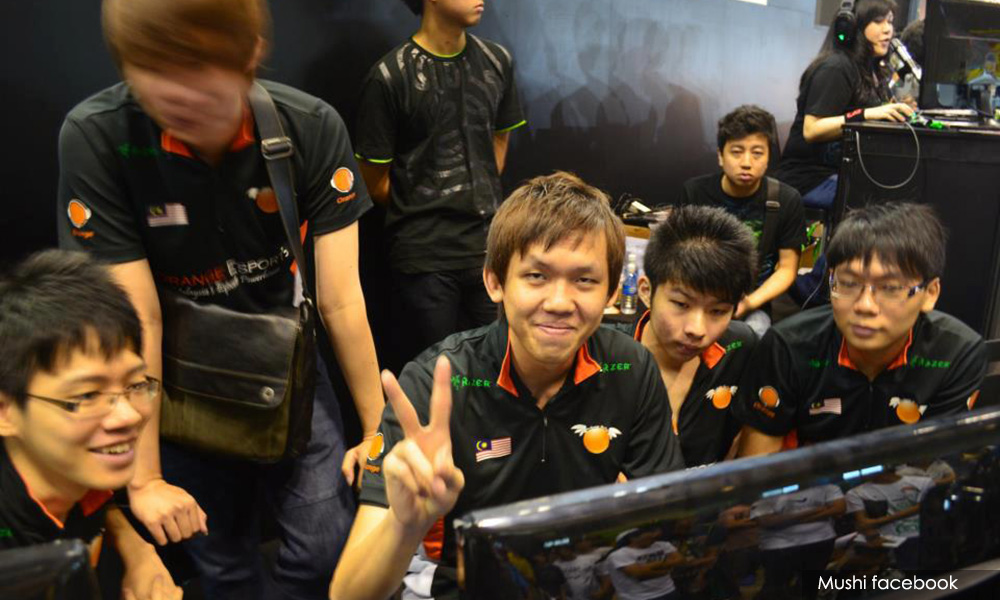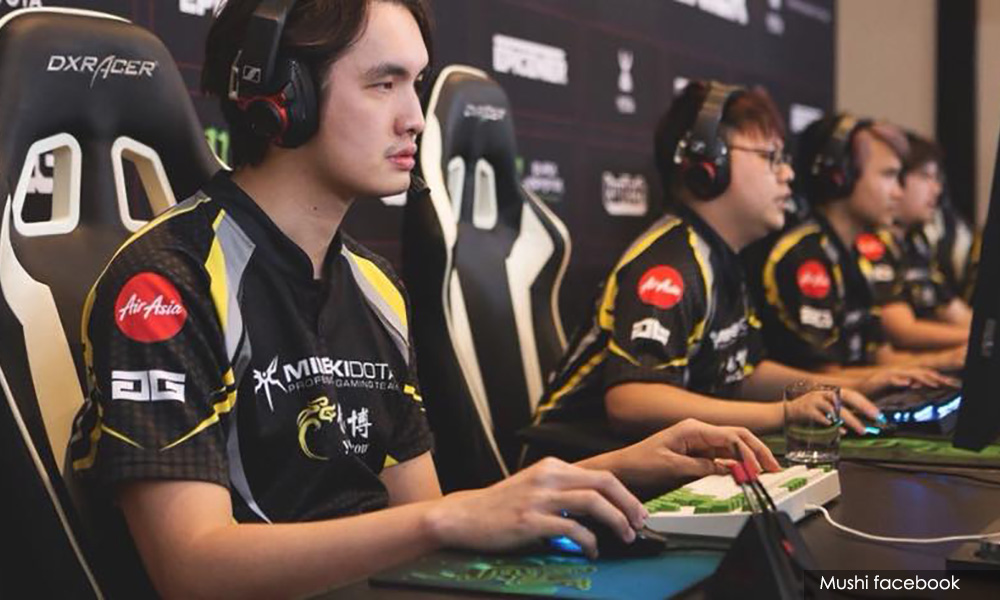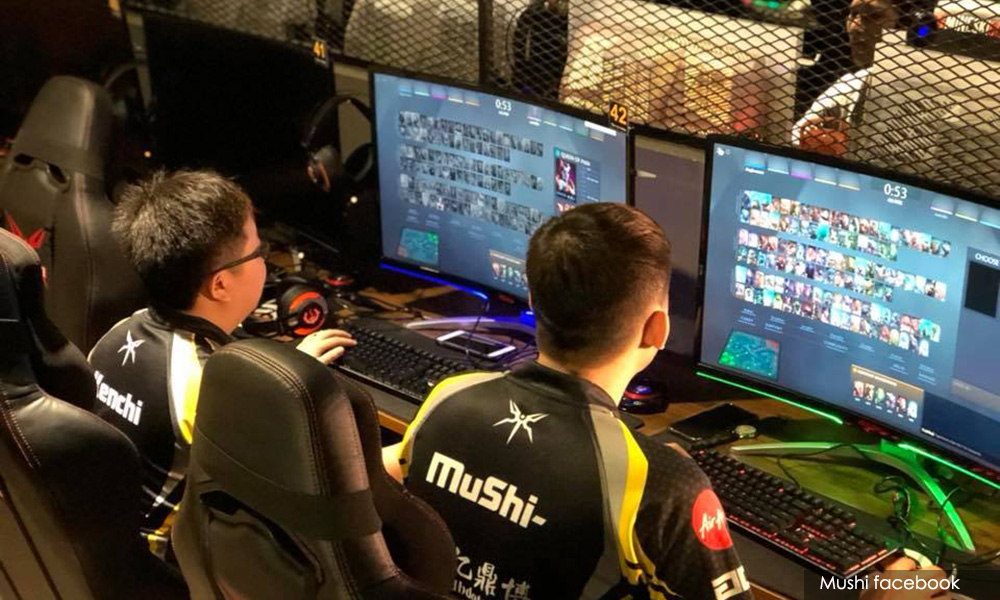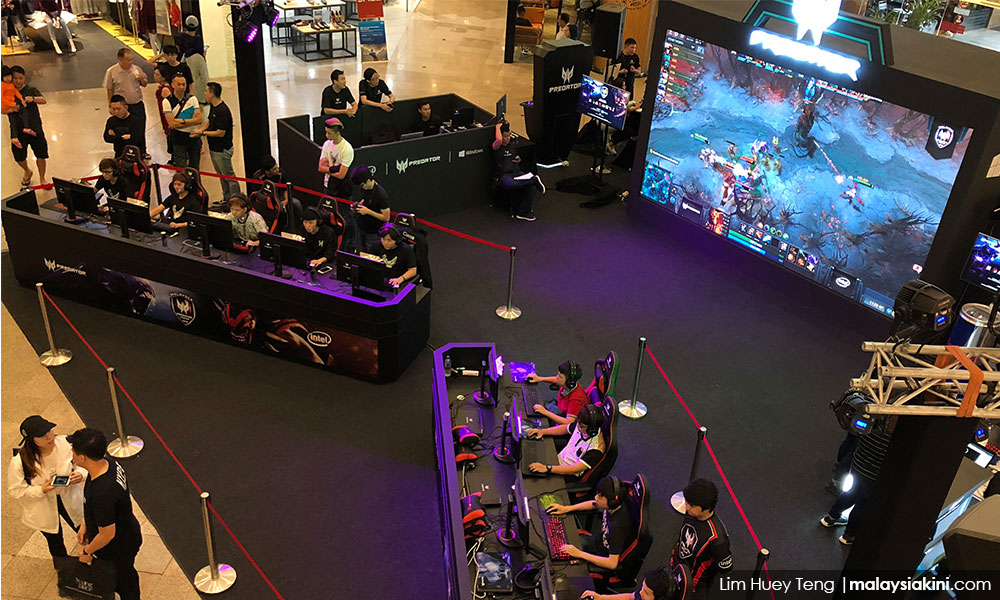MALAYSIANSKINI | This August, Chai 'Mushi' Yee Fung will be travelling to Vancouver to compete in The International 8 (TI8), a Dota 2 tournament with a total crowdfunded prize pool of over US$20 million dollars (over RM80 million) and growing.
Dota 2 is a popular multiplayer online battle arena (Moba) game which has broken the record for the largest prize pool for competitive computer gaming – otherwise known as e-sports – seven years in a row.
Last year’s tournament (TI7) had a total prize pool of US$24 million (RM 97 million), and the winning team took home US$10.8 million (RM 43 million).
For comparison, the amount won per champion at TI is similar to the amount won by the champions of tennis Grand Slams like Wimbledon or the French Open.
Mushi, 28, is Malaysia’s most successful e-athlete to date, and one of its most experienced, having been in the scene for over a decade.
Born in Ipoh and raised in Rawang as the youngest of four boys, Mushi’s journey to success began with some hard times.
“When I first started, my family didn’t like me playing so much. They knew I didn’t like studying.
“One day, my mother was so angry about how I wanted to play instead of going to school, that she locked me out of the house. While waiting outside the house, I remember a bus passing by, and I hid behind a car because I was so ashamed and didn’t want any of my friends to see me locked out like that.
“But it’s ok, it was a lesson. My mom let me in again after a few hours. She still loved me,” he remembers fondly.
Young Mushi finally reached a deal with his parents, where he was given one year to pursue his dreams.

“They gave me one year to play, and if I couldn’t achieve anything in that year, I would have to stop playing and go work. That one year changed my life.”
Passionate about winning for Malaysia
In gaming circles, Mushi is also known for his passion in representing Malaysia, and helping grow the local e-sports scene.
“In 201, I played for a Chinese team in China, Team DK. I was winning a lot then, doing well in almost every tournament we were in. But I wasn’t very happy and didn’t find it very exciting, maybe because it felt like I wasn’t playing for my country. After a year, I decided to come back to fight with my flag.
“Even though I was earning more in China than in Malaysia, it’s definitely different when you’re fighting for your country.
"When playing with overseas teams, the feeling is different, it’s not like we’re best friends or anything, rather we are just like teammates. When I play with Malaysians it’s different, we share the same language, we have the same social life.”
Mushi says there’s a lot of talent among gamers in Malaysia, but a lack of discipline seems to be holding many back.
“The main difference between Malaysian e-athletes and those from other countries comes down to attitude and discipline. Malaysia definitely has a lot of talent, but some players don’t have discipline, and this keeps them from going far.
“I saw a lot of players that are already pretty good, but then they just lose motivation, and start dropping down all the way. I’ve seen that a lot.”
Mushi, along with fellow Malaysian Kam “Moon” Boon Seng, and three other players from Southeast Asia, is a member of Team Mineski, one of the best 18 teams in the world who qualified to TI8.

Mineski became the first Southeast Asian team to win a Dota Major, the second highest tier of Dota tournament in the year after The International. The team emerged as champions of the Dota 2 Asia Championships in Shanghai last April, and bagging first prize of US$370,000 (RM1.5 million).
He’s hoping to replicate that success in the biggest tournament of the year, TI8, this coming August.
Asked if his journey in e-sports has been a happy one, Mushi said, “Life is difficult for sure, no matter what you do. For me, as a gamer, I feel very proud, because I’ve been part of e-sports for so long, and it makes me very happy.”
Mushi tells us all about that journey, in his own words.
I STARTED GAMING AT ABOUT 12. My first games were Ragnarok Online and Warcraft. I discovered Dota around the age of 15. Many of my friends played, and as I started playing more, I was driven to improve, and to become better than them.
THE FIRST TOURNAMENT I PLAYED IN was in my hometown of Rawang. In that scene, I used to think I was pretty good, like the game was so easy for me. Later I started to notice that there are a lot more pros outside, in KL and Malaysia. That’s when I promised myself that I was going to beat them too one day.
I started looking for tournaments everywhere in Malaysia. Things were very difficult at that time. You had to pay for everything yourself – petrol, hotels, registration fees. The biggest prize pool then was only RM 2,000, and it took me two years of playing and losing in tournaments to win even that.
Still, I was inspired to keep going because I felt I was learning in every tournament I lost.
THE HARDEST PART ABOUT TRANSITIONING to a professional was when I was losing and losing. I started to doubt myself, asking: Am I really a pro? Am I really good? Can I really achieve something? It was very hard to go through those feelings. In the end, we just have to figure out a way to believe in ourselves, and keep going.
I used to play a lot of different sports, and I was pretty good at them, but I eventually gave up on most of them. I had never really been successful at anything. I didn’t want to become someone who just gave up easily. Dota for me was a chance to be really successful at something for a change.

ALTHOUGH I DIDN’T ATTEND TI1, it was a real turning point. The huge prize pool showed all of us that Dota could really change our lives. It was announced that TI would be held every year. That first year (2011) the prize pool was only US$1 million, but that was already enough to change the life of every player.
TODAY, THE BIGGEST CHALLENGE I FACE is focusing and concentrating on the game. There are a lot of young kids coming up, and they are very good at focusing and concentrating. They don’t have any other distractions. As people get older, they have a lot more things to consider like family or girlfriends - these are all something like distractions. For me right now, I just need to concentrate more.
WE STILL HAVE A LONG WAY TO GO before e-athletes are regarded at the same level as normal athletes. E-athletes are a young generation coming up, they still need a lot of time to make themselves become real professionals.
Every player that is playing well deserves to be recognised. If everyone treats themselves like a pro, then they have the potential to become a pro. With some people, they just play, but the way they act is not professional. If e-athletes carry themselves more professionally, they will get more recognition.
DISCIPLINE IS REALLY IMPORTANT. It’s just like how when you go to school, you can’t be late. For instance, there are five of us in a team, and if four are on time, and one is late because he woke up late, then the rest won’t be happy. If you keep doing this, you will get used to it and your discipline is gone.
In other countries, they just don’t care, they will do whatever they need to win. In countries like China, you really have to become very, very good, in order to achieve something. If you’re not good enough, then you’ll just get kicked out. It’s extremely competitive, and the competitiveness makes them stronger.
MALAYSIA ISN’T REALLY COMPETITIVE ENOUGH RIGHT NOW. Malaysia back when I was starting out was a good environment to grow in. There were a lot of Malaysian tournaments, and I joined every tournament. That’s where I learned from other pros, and that’s what made me better and better.
Right now Malaysia has less tournaments, and for the tournaments that are held, the first thing they do is ban pro players. If the pro players join, then other young or amateur players and teams don’t seem to like to join, meaning there will be less teams in the tournament.
But that’s not a good environment for the pro scene. It is important for young players to play against pros to learn. Right now, we don’t have a platform for young Malaysians to become better.
I BELIEVE THE NEW GOVERNMENT WILL HELP A LOT IN E-SPORTS. Even the previous government held a lot of tournaments, and they recognised e-sports by helping young players and holding a few events. The best way for the new government to help is to have more tournaments, and maybe to help create an academy or a platform for new, emerging players.

THERE ARE MANY OPPORTUNITIES FOR NEW TALENTS. Right now, there are still a lot of organisers willing to sponsor players and form a team. But it really depends on the player’s attitude. A lot of organisations don’t mind helping you to become good, but you need to prove that you are willing to learn, that you have a good attitude, and a future.
A lot of people say that I am very talented, but I don’t think of myself that way. I just liked one thing, and I just kept doing it and doing it. That’s why I spent more effort than most people to become what I want. Maybe it takes a talented person seven hours a day to achieve what I need 14 hours a day to achieve.
IT WAS HARD FOR MY PARENTS TO UNDERSTAND how much we can earn in e-sports. But now, even in Malaysia, you can just check a lot of the news through Google or anything, and there’s now a lot of info about e-sports, and how much money there is in e-sports.
Let’s say as a young person, when you go out now to work, it’s impossible that you can start off with a high salary. They can only give you a basic salary, you need to learn and learn, you need to work harder to climb up and get a lot.
It’s definitely the same in e-sports. Maybe when you start you get zero. One year later, you get a bit better, then you get a little bit of payment, and after another year, you achieve something, then you get good payment. That amount of pay could be better than other options. That’s why for me, it’s a job, same as other jobs.
E-ATHLETES STILL CAN HAVE A GOOD CAREER after retiring from playing. Let’s look at the worst-case scenario. I’m 28 now, let’s say I retire at 30, meaning I’ve played professionally for 10 years.
I think what I’ve earned compared to a normal working person is much more. If I know how to manage my money, I can invest in a lot of things, I can save my money. Maybe it would take a normal working person working until they were 50 years old to accumulate the same amount of savings.
As a pro player, we still have other ways of working after retiring, like being a coach, a manager, or a streamer – someone who hosts an online video stream of himself or herself while gaming, which can be viewed by the public.
Those who don’t like the stress of being a pro player can go into streaming, where there’s a lot of money too. That’s why I believe gamers can now earn a lot, even though you’re not professional.
People need to know how to manage their money. Some players spend their money too fast. Some handle their money very well. They invest well, and buy a house or a car.
AFTER I RETIRE, MY PLAN IS TO HELP MALAYSIA’S E-SPORTS SCENE. Maybe I can help to set up an academy for e-sports, not just for Dota but for other games as well.
I am not a pro in other games, but I believe there are many things I can share with younger players beyond in-game skill about the road to becoming a professional player. I believe my experience can help a lot of younger players that want to get good.
MALAYSIANS KINI is a series on Malaysians you should know.
PREVIOUSLY FEATURED
Patriot’s Arshad defends country by speaking out against corruption
'I'm very clumsy, I fell into stand-up comedy'
Why Nasa scientist Amani chose M’sia over the stars
Working hard to revitalise country’s traditional arts
Living life in the face of muscular atrophy
Lighting the way for neglected girls
The rebel educator who seeks to enlighten people
Rendering aid to the Rohingya through education
Bringing a ray of hope for refugee children
M’sia's first woman BRT captain drives her way to top
The real Orked remembers sister Yasmin's life and career

